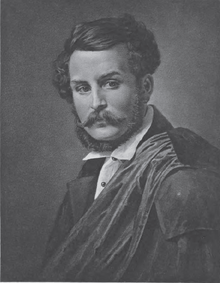Carl Wilhelm Böttiger
Not to be confused with Karl Wilhelm Böttiger, the son of German archaeologist Karl August Böttiger.
| Carl Wilhelm Böttiger | |
|---|---|
 Portrait by Olof Johan Södermark |
Carl Wilhelm Böttiger (15 May 1807 - 22 December 1878) was a Swedish writer.
Biography
He was born in Västerås, and studied at the University of Uppsala, where, after extensive travels, he was appointed professor of modern literature in 1845, and in 1858 professor of aesthetics, from which post he retired in 1867.
Work
He was exceedingly active as translator, poet, dramatist, and literary critic. Most of his publications in the latter capacity appeared among the Transactions of the Swedish Academy. It is perhaps by his verse that he is best known. His publications include:
- Lyriska stycken (Lyrical Pieces, 1837–39)
- Religiösa sånger (Religious Songs, 1841)
- Torquato Tasso, Gerusalemme Liberata, Swedish translation (1842–51)
- Dante, Divina Commedia, Swedish translation (1846–51).
- a biography of his father-in-law, Esaias Tegnér
His Samlade Skrifter (Collected Works) appeared at Stockholm (6 vols., 1856–81).
References
-
 Ripley, George; Dana, Charles A., eds. (1879). "Böttiger, Karl Vilhelm". The American Cyclopædia.
Ripley, George; Dana, Charles A., eds. (1879). "Böttiger, Karl Vilhelm". The American Cyclopædia.
 This article incorporates text from a publication now in the public domain: Gilman, D. C.; Thurston, H. T.; Colby, F. M., eds. (1905). "Böttiger, Carl Wilhelm". New International Encyclopedia (1st ed.). New York: Dodd, Mead.
This article incorporates text from a publication now in the public domain: Gilman, D. C.; Thurston, H. T.; Colby, F. M., eds. (1905). "Böttiger, Carl Wilhelm". New International Encyclopedia (1st ed.). New York: Dodd, Mead.
This article is issued from Wikipedia - version of the 11/17/2016. The text is available under the Creative Commons Attribution/Share Alike but additional terms may apply for the media files.